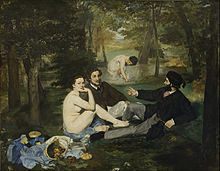[contextly_auto_sidebar id=”YYQ5BrKAlLhK2VSvLagOYij5KMvYrB2z”]
WELL, both, and neither, I can hear someone out there growling. But what I mostly hear in the culture at large is that we — citizens, worker bee, student, scribe — need to “adjust” to the brave new world of digital technology. Some of us do. But as someone who’s been to numerous exhibits and conferences on “art and tech,” I’ve long been uneasy with the suggestion that visual artists (or musical or literary artists, for that matter) need to embrace the latest “innovation.”
The art critic Dave Hickey put his finger on this in a recent post.
What troubles me about the contemporary relationship between art and technology: Since Manet, art has thrown itself up as a counter discourse to the reigning mainstream technology. Impressionism threw itself self up to counter the new hegemony of photography. Futurism threw itself up against to the rhetoric of ancient Italy. Surrealism threw itself up to counter the reign of the verisimilar image. Abstract Expressionism exploded in the face of residual wartime regimentation. Pop arose to counter the graphic, black and white, Fifties. Minimalism is eccentric in its pretentions: It threw itself in the face of history and of all other art. Then Conceptualism arose to counter the shiny, Technicolor sixties and prefigure the digital future. Once the digital future arrived, I was rather assuming the return of haptic, tactile, fractal in the art world. But no! Academics always want to do things the easy way. Facebook succeeded Press-Type, Digital printouts succeeded Xeroxed photographs, and we have limped along through half a century of geriatric post-minimalism. Is it just my friend Dave who’s being bored to tears?
I don’t just think it’s Dave here. In his book of jazz criticism, The Imperfect Art, Ted Gioia wrote about the way jazz has historically framed itself in opposition to technology and mass production. The subject is big and complex, but has me thinking.

I am in the “both and neither” camp. But let me come at it from a different direction. When I think of technology and art, what I see is an incredible breadth of choices that we have now compared with two centuries ago. In those days, there was not only less technology, but also stricter cultural allowances in the visual arts and music. Now, we have hundreds of styles. There are lots of options; you can eschew the high tech or embrace it. Think of the installation art by Andy Goldsworthy using leaves and stones found on site compared to light shows on the Golden Gate bridge. I like parts of the whole spectrum.
Or, how about both mashed together. Here it gets very interesting to me. We are seeing unexpected mash-ups of old and new. Examples: I have a relative who writes and plays some sort of weird ambient pop music with a guitar hooked up to a computer – but he is excited about his latest release on vinyl! Artist Dru Blair is founding an art school of classical realism, but including an experienced digital artist on the faculty. And Mr. Blair uses an airbrush himself. (www.blaircollege.org.) Finally, Ballistic publishing publishes an annual collection of digital art called the “Expose'” series. Each year they honor a pioneer in their field, but they freely acknowledge in their past choices, pre-digital pioneers such as H.P.. Giger and Roger Dean. In the latest edition, Ballistic interviews Mr. Dean and it is interesting to see that his concern does not lie with technology, but with the lack of craftsmanship he has seen in the past 50 years. And that ties in with your last 3 blog entries regarding art, music, and cinema.
I feel technology can absolutely bring good and bad to the arts. Just like it can bring good and bad to every other aspects of our lives. Art to me has been a picture into the age that it is being created. You can’t expect for the art now to not be part of and to depict the very tech savvy age we are in. I don’t feel that has to mean it’s better or worse than from the age before. It’s just different. I can see immense beauty and talent in video games these days just as much as I can see it from the paintings the ancient Egyptians portrayed on the walls. But there can be a balance, if we look for that balance.
There are some interesting points in time in this article however I don’t know if I see all of them heart to heart. There’s some validity however I’ll take hold opinion until I look into it further. Good article , thanks and we want extra! Added to FeedBurner as nicely